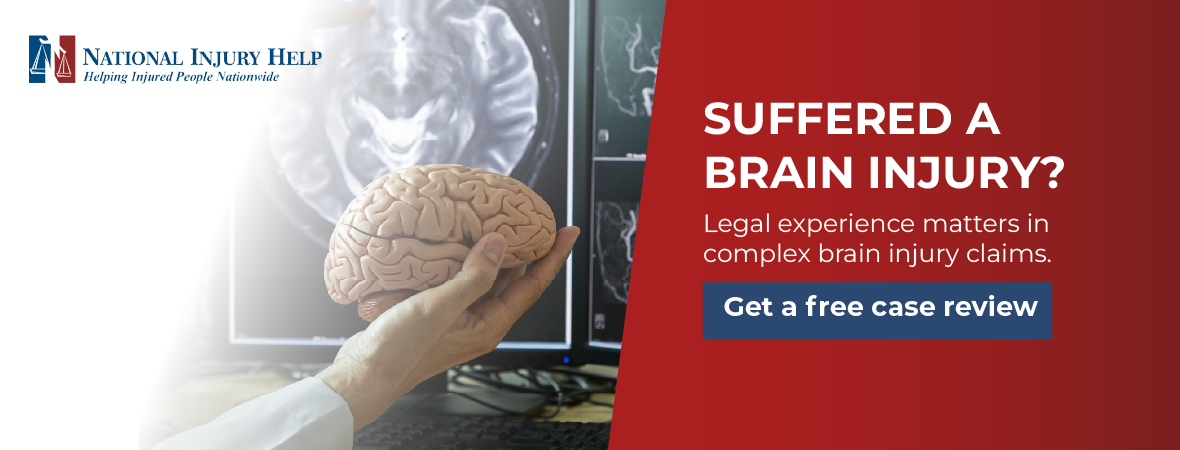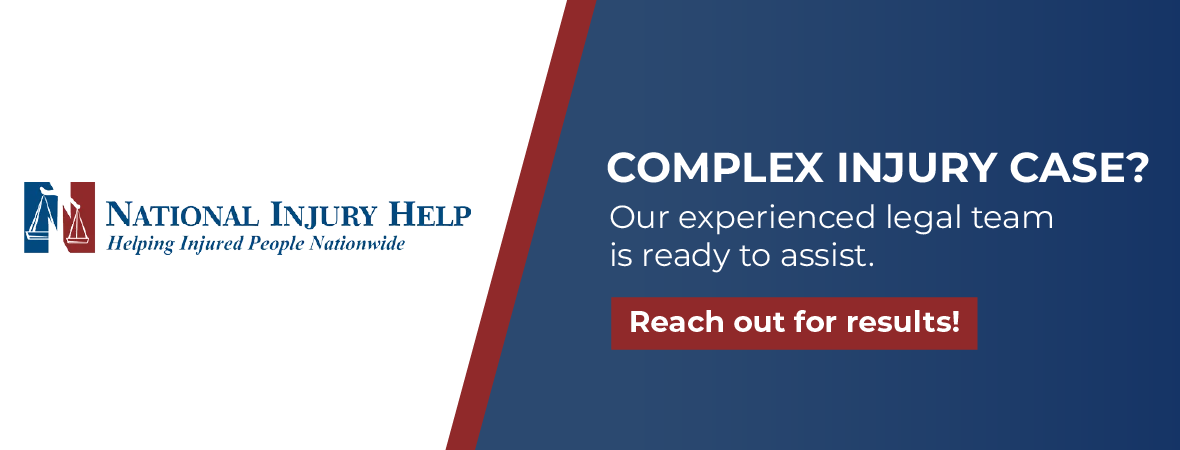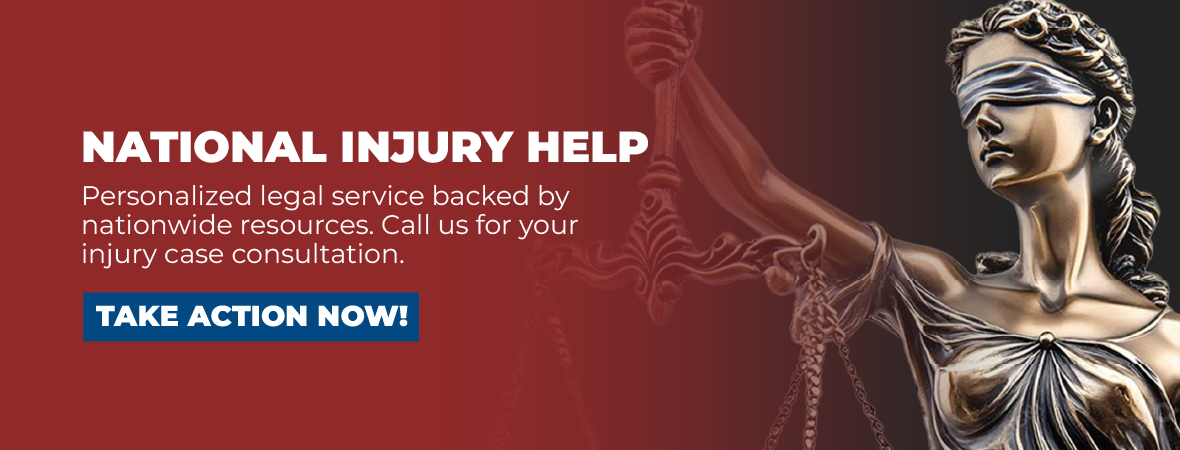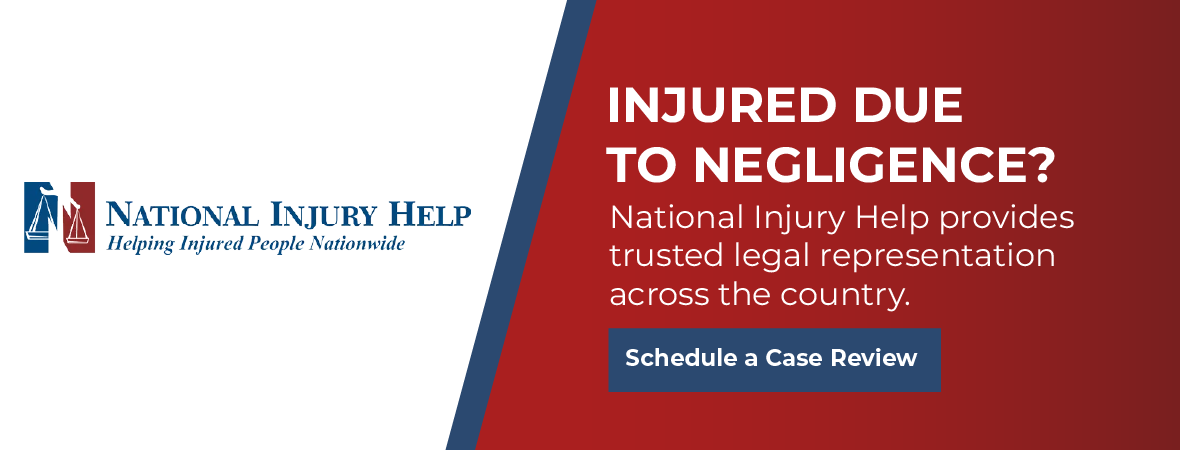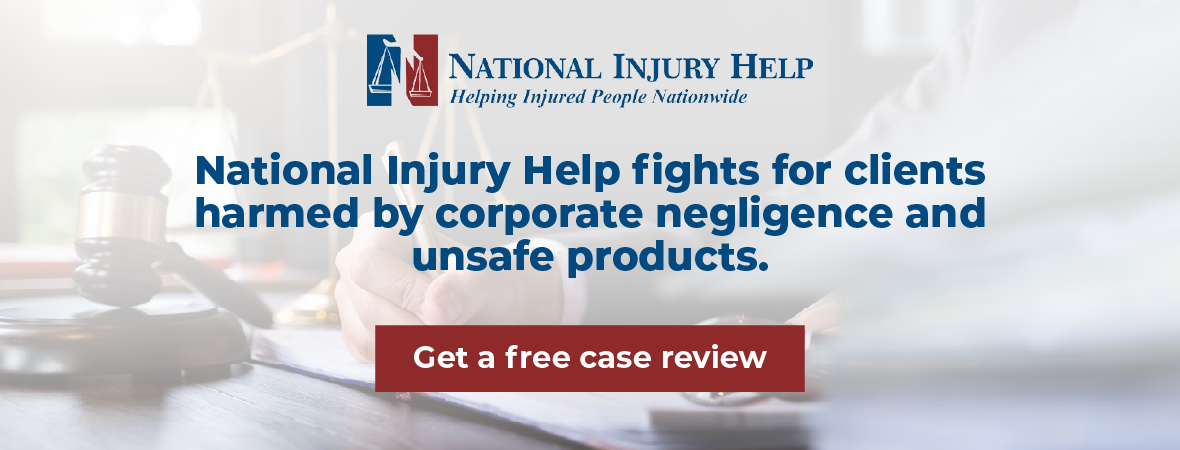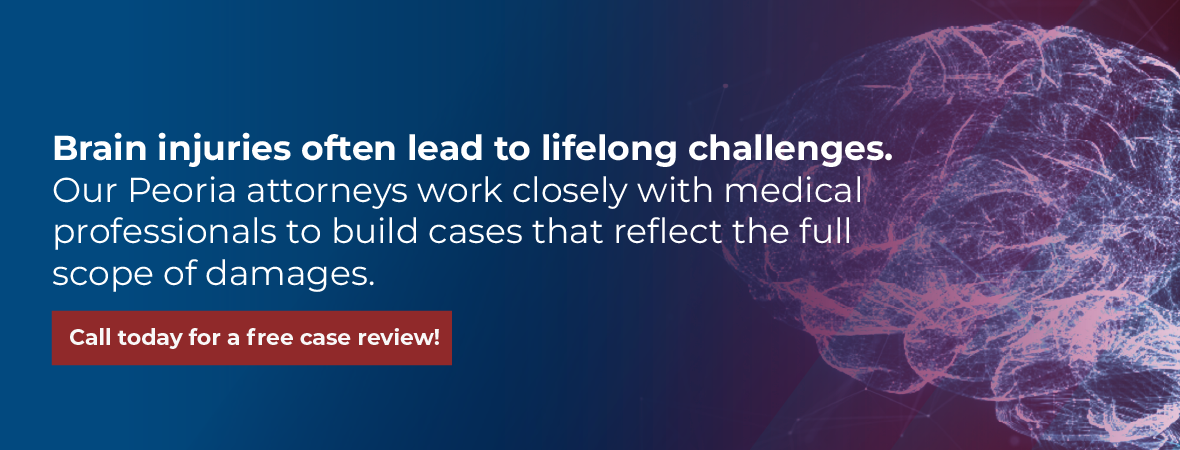A brain injury can change your life in an instant, impacting your physical, cognitive, and emotional well-being. If you or a loved one is dealing with the aftermath of such an injury, it’s important to seek support and guidance. Call National Injury Help at 1 (800) 214-1010 today to explore your options for recovery and assistance.
Life in Peoria can turn upside down in a single second. One quick slip on a grocery-store floor or a low-speed rear-end crash on Loop 101 can twist your neck, rattle your brain, and leave you wondering why familiar tasks suddenly feel impossible.
Traumatic brain injuries, often shortened to TBIs, rarely show up on the outside. You might look fine at first, even crack a joke on the ambulance ride, then wake up days later with crushing headaches, blurred vision, or a memory that will not hold new facts longer than a few minutes. Insurance adjusters love to seize on that gap between accident and obvious symptoms. They argue that you exaggerated, waited too long, or healed already.
A local lawyer who sees these tactics every week knows how to keep the record straight, how to push for specialist testing, and how to demand payment that continues long after the first emergency-room bill arrives. We are here to protect your future and guide you every step of the way.
What Is a Traumatic Brain Injury?
Before you can claim damages, you need words that explain what happened inside your skull. A traumatic brain injury is any disruption in normal brain function caused by an outside force.
Doctors divide injuries into two main groups. Closed-head injuries happen when the brain strikes the inside of the skull, but the bone stays intact. Open-head injuries involve a fracture or a foreign object that pierces the brain. Both can be devastating.
Early signs may be subtle. You might feel lightheaded, lose track of directions while driving home, mix up words, or grow irritable without reason. Nausea, ringing in the ears, blurry vision, and sleep changes often follow. Loved ones may spot personality shifts or sudden forgetfulness before you do.
Every symptom, no matter how small, belongs in a daily journal because patterns help doctors fine-tune the diagnosis and help lawyers show insurers the full scope of harm.
Common Causes of Brain Injuries According to a Peoria Brain Injury Attorney
The streets, businesses, and job sites of Peoria create repeat scenarios that push brains beyond their limits. Recognizing these patterns helps pinpoint who is responsible.
Car Accidents
Rear-end collisions at traffic lights along Bell Road whip the head forward, then backward, slamming the brain against the skull. Rollovers on rain-slick ramps send bodies tumbling, and the internal organs follow. Even at modest speeds, whiplash can generate enough rotational force to tear microscopic nerve fibers.
Motorcycle and Bicycle Accidents
Riders glide with nothing but a helmet between skull and pavement. A door opening in the Arrowhead area traffic can eject a cyclist headfirst onto the curb. Motorcyclists thrown from a bike on the Agua Fria Freeway may strike guard rails, cars, or the ground twice, causing coup-contrecoup injuries.
Pedestrian Accidents
A missed crosswalk signal at 83rd Avenue leaves a walker exposed. The initial bumper impact often hits the legs, yet the secondary impact of the head on the hood or windshield causes the most severe brain trauma.
Slip and Fall Incidents
Wet floors in big-box stores, cracks in older sidewalks near Old Town, and dim stairwells in apartment complexes create perfect storm conditions. A fall from standing height can fracture the skull or cause a slow bleed that goes unnoticed until cognitive fog sets in.
Workplace Accidents and Falling Objects
Construction along the Loop 303 corridor raises ladders and scaffolds daily. A dropped wrench gains speed fast enough to crack a hard hat. Warehouses stack heavy crates that can topple during forklift mishaps. Even retail stock rooms hide risks when boxes tumble from high shelves.
Long-Term Consequences of a Brain Injury
Immediate treatment stops a crisis. Long-term recovery is a marathon. Understanding these lasting effects primes you to demand settlements big enough to cover the road ahead.
Cognitive Effects
A brain under strain works slower. Patients describe feeling like thought flows through molasses. Forgetting appointments, losing track of bills, and struggling to plan the simplest chores undermine confidence and employment prospects.
Emotional and Behavioral Changes
The control center for emotion sits inside the brain. Damage there can unleash depression that drains energy, anxiety that blocks social outings, or aggression that surprises friends. Mood swings shake relationships and complicate parenting.
Physical Impacts
Seizures often appear months after the original injury. Impaired coordination makes walking a tightrope exercise. Chronic pain in the neck or post-traumatic headaches can flare with little warning, making full-time work a gamble.
Loss of Independence and Quality of Life
Driving may become impossible. Cooking can turn risky if memory lapses leave burners on. Careers stall or vanish. Hobbies that once defined your week slip out of reach, shrinking social circles and sense of self.
Peoria Brain Injury Attorney Explains Arizona Laws Affecting Brain Injury Claims
Legal rules shape strategy, so knowing them early helps you avoid pitfalls.
Statute of Limitations
You usually have two years from the day you were hurt to file a lawsuit. If government negligence is involved, such as a city bus crash, a formal notice must go out in just six months. Missing these dates almost always ends your claim.
Comparative Fault
Arizona follows pure comparative fault. You may recover head trauma compensation even if you hold part of the blame. A jury assigns percentages. If you are twenty percent at fault, your award drops by that amount, not to zero.
No Damage Caps
Arizona’s constitution blocks lawmakers from capping damages in most injury cases. That means juries can award exactly what the evidence supports for medical bills, lost wages, and suffering.
Legal Elements to Prove in a Brain Injury Lawsuit
Every case requires proof that someone owed you a duty, breached that duty, caused your injury, and left you with actual damages. Evidence comes from accident reports, expert testimony, and clear medical records. A well-prepared lawyer connects these dots so jurors can see the straight line from careless act to brain trauma.
Types of Damages an Experienced Peoria Brain Injury Attorney Can Help You Seek
Money can never replace a clear mind, yet it pays for tools and time that support healing.
Medical Expenses
Think beyond the first emergency room fee. You may face follow-up imaging, neuro-psych evaluations, speech therapy, occupational therapy, medication for seizures, and adaptive devices for mobility. Future care can dwarf initial costs, and settlements must account for inflation and decades of treatment.
Lost Wages and Reduced Earning Capacity
A week off work is only the start. Some survivors return part-time with lower pay. Others must abandon a career field entirely. Vocational experts compare old earning trajectories to new ones and translate lost opportunity into dollars.
Pain and Suffering
Physical agony, daily migraines, blurred vision, and the despair that comes from watching friends move on without you count as real harm. Jurors may use multipliers or per-diem models to place a figure on intangible suffering.
Future Care Costs
Life-care planners build road maps of future needs: home health aides, wheelchair-friendly renovations, specialized vans, and computerized speech devices. These costs often run into seven figures. Securing them now prevents a crisis later.
Punitive Damages
When a driver texts at eighty miles per hour or an employer removes safety guards to save time, a jury can punish that extreme negligence with extra damages. These awards also warn others to act safely.
How a Peoria Brain Injury Attorney Can Help You
Recovering from a brain injury is a difficult journey. It involves managing medical appointments, physical symptoms, and often significant emotional strain. On top of all that, handling the legal and financial side of your recovery can feel overwhelming. That is where a dedicated Peoria brain injury lawyer can make a real difference.
Their assistance isn’t limited to filing paperwork. They connect you to specialists, preserve critical evidence, handle insurance communications, build a compelling case for compensation, and prepare for trial if necessary, all while you focus on healing and recovery.
1. Connect You with Brain Injury Specialists
Brain injuries often present symptoms that are not immediately visible. Memory problems, personality shifts, cognitive delays, and emotional issues may become apparent only weeks or months later. A good attorney will introduce you to a network of trusted medical professionals who specialize in identifying, diagnosing, and documenting these subtle but serious issues.
- Neurologists and neuropsychologists: These specialists conduct tests and evaluate brain function. They can identify cognitive issues, memory lapses, concentration problems, or processing delays that may not be obvious yet significantly affect daily life.
- Rehabilitation teams: Occupational therapists, speech therapists, and vocational rehabilitation experts help patients regain lost skills or learn new ways to cope and compensate. Attorneys can help you access top-tier local rehab centers that accept payment only after your legal case resolves (known as liens), reducing your cost burden during recovery.
- Psychologists and mental health providers: Brain injuries often trigger anxiety, depression, mood swings, PTSD, or behavioral changes. A psychologist can track and treat these symptoms while documenting them for your legal case. These records help show the full impact of the injury over time.
Together, these medical professionals build a comprehensive picture of how your life changed after the injury and what treatment you need now, and will need in the future.
2. Investigate and Preserve Key Evidence
In brain injury cases, evidence fades fast. Dashcam footage is erased after a few days; witness memories dim even faster; road or walkway hazards are often cleaned after an accident scene. A Peoria-based brain injury attorney springs into action quickly.
- Preservation letters: These letters tell insurance companies, businesses, property managers, or government entities to secure all relevant records and stop data destruction.
- Subpoenas: Attorneys may request phone data, vehicle recorder logs, security camera footage, or EMS records directly from the source.
- Site investigations: If the injury came from a car wreck, slip, or fall, the attorney’s team visits the scene, photographs lighting, hazard markers, skid marks, signs, or uneven pavement before weather or cleanup changes anything.
- Expert analysis: In complex accidents, engineers or safety experts may recreate events, using models, lighting simulations, or technical reconstructions to show exactly what happened.
By moving fast and using formal legal tools, your attorney ensures evidence is preserved and charted, so when your medical records show delayed post-concussion symptoms or cognitive decline after a crash, the link is clear and well-documented.
3. Handle All Insurance Communications
Insurance companies are businesses. Their adjusters look to close cases fast and minimize payouts. They may request recorded phone statements or offer quick settlements, often before you have a clear picture of your long-term needs. A lawyer protects you from these pressure tactics.
- Recorded calls: Insurance adjusters may ask you to describe what you felt at the scene or how long you have been dizzy, questions that can be cut and rearranged to suggest you are exaggerating or healed faster than you are.
- Demand letters and coverage reviews: Your attorney will send formal communication to insurers, requesting documentation of policies, coverage levels, and deadlines. This ensures you know what benefits are available.
- Negotiation shield: Adjusters must now negotiate through your attorney, increasing the perception that you are prepared for court if needed. This gives you a stronger position.
- Written documentation: Every offer, counteroffer, or denial is delivered through official letters. That allows your attorney to compare value, highlight inaccuracies or missing information, and build a strategic response plan.
By eliminating confusion, protecting your rights, and applying negotiation pressure, your lawyer gives you a clear path to fair compensation, based on facts and evidence, not insurance company tactics.
4. Build a Strong Damages Case
Brain injuries come with a wide range of consequences, including medical, financial, emotional, and cognitive. To recover full value, your case must include all of them in a clear, compelling format.
- Plain language medical reports: Brain scan images, neuropsychological test results, and therapy progress are turned into understandable narratives so jurors or insurers can see how your life has changed.
- Economic projections: An economist estimates your future medical expenses, therapy, and lost income, including potential career changes due to cognitive limitations.
- “Day-in-the-life” videos: These videos document your day-to-day struggles, asking for help getting dressed, struggling with concentration, or dealing with memory issues. They illustrate hidden disabilities that written notes can’t.
- Expert testimonies: Medical professionals, vocational assessors, therapists, and economists may testify in court (if needed) about the real effects and future consequences of your injury.
- Organized evidence file: Bills, reports, prescription costs, and therapy timelines are cataloged to demonstrate both past costs and projected future needs in easily reviewed formats.
This layered evidence strategy puts the full impact of your injury before a jury or insurer, turning invisible loss into visible facts.
5. Prepare for Trial if Needed
Most brain injury claims settle once insurance companies see the detailed evidence and expert support, especially when attorneys show they are ready for trial.
However, some carriers refuse to offer full compensation. In that case, your attorney prepares the case for court:
- File the lawsuit: Your attorney prepares and files a complaint in the appropriate venue, typically the Maricopa County Superior Court.
- Discovery: This phase involves written questions (interrogatories), document exchange, and depositions under oath. Both sides share evidence, request additional documentation, and interview witnesses and experts.
- Pre-trial motions: Lawyers file motions to limit or expand what evidence the jury will ultimately see, such as admitting neuropsychological test results or excluding unrelated injuries.
- Exhibits and demonstrations: Lawyers prepare high-impact tools like brain scan visuals, audio-visual exhibits, medical timelines, and life-impact charts. These tools help jurors understand the science and life impact.
- Trial preparation: Your lawyer prepares you for testimony, reviewing questions, discussing courtroom dynamics, and guiding you to stay focused. They also prepare direct and cross-examination strategies.
By presenting a detailed narrative, supported by expert opinion and real-life impact, your attorney increases the chance of a verdict that reflects all your losses.
6. Provide Ongoing Support and Advocacy
Throughout the process, an attorney supports you in many ways:
- Communication: You receive clear updates, not cryptic legalese. You have questions answered promptly.
- No financial burden upfront: Most brain injury attorneys work on contingency; they collect no fee until you recover compensation. Legal expenses like experts, report costs, court fees, and depositions are handled by the law firm while your case is in progress.
- Emotional relief: Legal stress is removed from your daily life. You can focus on recovery instead of filing forms, scheduling depositions, or defending against low settlement offers.
- Adaptability: Brain injury cases often evolve as new symptoms or medical complications emerge. A skilled attorney updates and reworks claims as needed.
Contact a Peoria Brain Injury Attorney Today
A brain injury can change everything. From your ability to work to how you connect with your loved ones, the impact can be overwhelming. If you or a family member has suffered a brain injury in Peoria, Arizona, it is important to take action quickly. Getting legal help early can make a big difference in how your case is handled and how much compensation you receive.
At National Injury Help, we understand the seriousness of brain injuries. Our attorneys work with medical experts, therapists, and life care planners to show the full impact of your condition. We serve clients in Peoria and surrounding areas, including Glendale, Sun City, and Surprise. If someone else’s carelessness caused your injury, we are here to hold them accountable.
We know you may be facing long recovery times, high medical bills, and a lot of uncertainty. That is why we offer a free consultation to help you understand your rights. You will not pay any legal fees unless we win your case. This means you can focus on healing while we focus on the legal fight.
When you reach out, we will listen to your story, answer your questions, and explain what happens next. If we take your case, our team will act quickly to preserve evidence and build the strongest case possible.
Call us today at 1 (800) 214-1010 to speak with a TBI lawyer in Peoria who will fight for the support you need. Let us help you move forward with confidence.
Frequently Asked Questions (FAQ) for Brain Injury Victims in Peoria
What is considered a traumatic brain injury (TBI) in a legal claim?
A traumatic brain injury is any disruption in normal brain function caused by an outside force. This includes both closed-head injuries, where the brain strikes the inside of the skull, and open-head injuries, which involve a fracture or penetrating object. Even subtle symptoms like lightheadedness, memory lapses, irritability, or blurred vision can indicate a TBI that may be the basis for a legal claim.
What are the most common causes of brain injuries in Peoria?
Common causes in our area include car accidents on roads like Loop 101 and Bell Road, motorcycle and bicycle accidents, pedestrian accidents, slip and fall incidents in local stores or on sidewalks in Old Town, and workplace accidents at construction sites along the Loop 303 or in warehouses.
How long do I have to file a brain injury lawsuit in Arizona?
Arizona has a statute of limitations that generally gives you two years from the date of your injury to file a lawsuit. However, if government negligence is involved (like a city bus crash), you may need to file a formal notice within just six months. It is critical to act quickly to avoid losing your right to compensation.
What if I was partially at fault for the accident that caused my brain injury?
Arizona follows a “pure comparative fault” rule. This means you can still recover compensation even if you were partially to blame. Your financial award will be reduced by your percentage of fault. For example, if you are found 20% at fault, your recovery is reduced by 20%, but you are not barred from recovering.
What kind of compensation can I seek for a brain injury?
You can seek damages for medical expenses (including future care), lost wages and reduced earning capacity, pain and suffering, and in cases of extreme negligence, punitive damages. Arizona law does not cap damages in most personal injury cases, so you can seek full compensation for your losses.
Why do I need a Peoria brain injury attorney instead of handling the claim myself?
Brain injuries are complex. An attorney can connect you with medical specialists, investigate and preserve evidence before it disappears (like footage from local businesses), handle all communication with insurance companies who may try to minimize your claim, and build a strong case that accounts for your long-term needs. They work on a contingency fee basis, meaning you pay nothing unless they win your case.
How can an attorney help if my brain injury symptoms are not obvious?
Symptoms like memory problems, personality changes, or cognitive delays can appear weeks or months after the accident. A Peoria brain injury attorney has a network of trusted medical professionals, such as neurologists and neuropsychologists, who can properly diagnose and document these “invisible” injuries to prove the full extent of your damages.
What should I do first if I think I have a brain injury?
Seek medical attention immediately. Then, contact a Peoria brain injury attorney for a free consultation. They can advise you on the next steps, such as starting a daily journal of your symptoms and preserving evidence, while you focus on your recovery. You can call National Injury Help at 1 (800) 214-1010 to speak with someone today.





